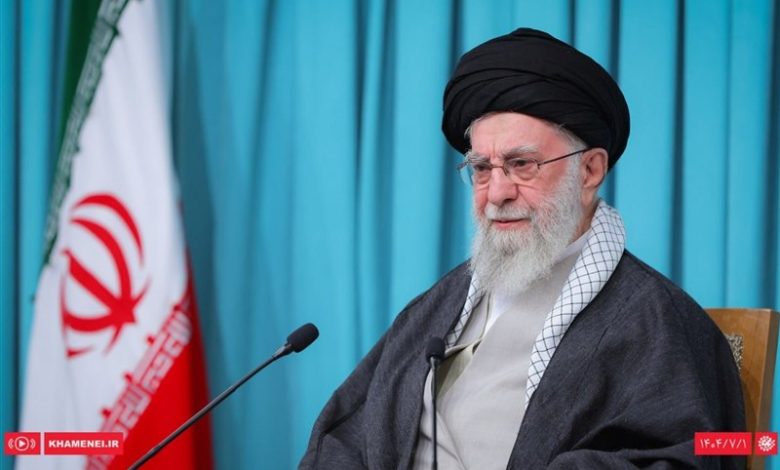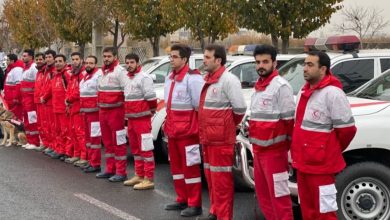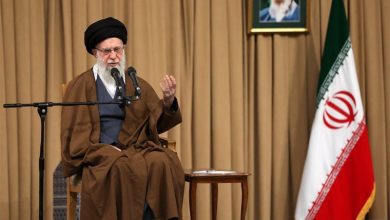Imam Khamenei: Under the current circumstances, negotiations with the United States hold no benefit for us.
The Supreme Leader of the Islamic Revolution stated that during the twelve-day war, the unity and cohesion of the Iranian nation disheartened the enemy. From the very early and mid-days of the conflict, the enemy realized that it would not achieve its intended goals and objectives.

According to the Sadye-Sama news website:
Tonight, Tuesday, Ayatollah Khamenei, the Supreme Leader of the Islamic Revolution, addressed the Iranian people in a televised speech. He described the ongoing unity and cohesion of the Iranian nation as a “steel fist upon the enemy’s head” and, while explaining why the proud Iranian nation does not yield to the enemy’s pressure or threats to abandon the highly beneficial uranium enrichment technology, emphasized: negotiations in which the United States dictates the outcome from the start are useless and harmful, because they embolden the coercive enemy to impose further objectives while providing no real protection against threats. No honorable nation or wise statesman would accept such negotiations.
At the beginning of his remarks, the Supreme Leader congratulated the people on the beginning of the month of Mehr, marking the start of the school year and the pursuit of knowledge and capability by millions of young Iranians. He urged officials—particularly those in the Ministries of Education, Science, and Health—to recognize the extraordinary talents of Iranian youth and utilize this divine blessing effectively.
Referring to the 40 international medals won by Iranian students in the past two months, including 11 golds, he said: despite the twelve-day war and its challenges, Iranian students achieved first place globally in astronomy and earned strong rankings in other fields. These same talents recently enabled young Iranians to shine in wrestling and previously in volleyball and other disciplines.
Ayatollah Khamenei also commemorated the anniversary of the martyrdom of Sayyid Hassan Nasrallah, describing him as a tremendous asset for Islam, Shi’ism, and Lebanon. He emphasized that the wealth and legacy created by Sayyid Hassan, including Hezbollah, remain ongoing and should not be neglected in Lebanon or elsewhere.
Paying tribute to the martyrs of the twelve-day war, including military commanders and scientists, he offered heartfelt condolences to their families. He focused his televised address to the nation on three main points: the importance of Iranian national unity during the twelve-day war and for the country’s present and future, the significance of highly beneficial uranium enrichment, and the steadfast and wise stance of the nation and government in the face of U.S. threats.
Regarding the first point, he said that national unity was the primary factor in the enemy’s failure during the twelve-day war. The killing of commanders and influential figures was intended by the enemy to create chaos, incite unrest in Tehran, mobilize the people against the Islamic Republic, and disrupt the country’s affairs to undermine the Islamic system.
Ayatollah Khamenei noted that the rapid appointment of replacements for the martyred commanders, the strengthened morale of the armed forces, and orderly governance were important factors in thwarting the enemy. However, he emphasized that the people themselves were the most decisive element, standing united against the enemy while filling the streets in defense of the Islamic Republic.
He further mentioned that the enemy questioned its agents in Iran due to their inability to achieve the intended disruption, to which the Zionist and U.S.-backed agents responded: “We tried, but the people turned their backs on us, and the officials managed the country.”
The Supreme Leader stated that this unity rendered the enemy’s plans ineffective and stressed that this decisive cohesion remains very effective today. He criticized those attempting to portray national unity as a wartime phenomenon, noting that despite natural political disagreements, all Iranian citizens—regardless of ethnic background—stand as one against aggressors.
Ayatollah Khamenei also addressed uranium enrichment, explaining its importance and value. He described how Iranian scientists convert domestic uranium into highly enriched uranium, which has wide applications in agriculture, industry, environmental protection, healthcare, nutrition, research, and energy production. He emphasized that enriched uranium allows electricity generation at lower cost and with minimal environmental impact, and noted that Iran has developed this technology over decades despite initial foreign non-cooperation.
He stated that while some countries aim to enrich uranium to 90% for nuclear weapons, Iran, having no such weapons and choosing not to pursue them, enriches up to 60%, which is sufficient. Iran is among the ten countries worldwide with enrichment capabilities, and in addition to advancing technology, it has trained numerous scientists, researchers, and skilled personnel. The enemy wrongly believes that bombing facilities or threatening attacks could halt this progress.
Ayatollah Khamenei highlighted decades of unsuccessful pressure by coercive powers to force Iran to abandon enrichment, noting: “We did not surrender, and we will not surrender, and in no other matter will we yield to pressure.” He contrasted past U.S. demands with current ones, pointing out that American insistence on completely halting enrichment amounts to demanding that Iran “throw away the great achievements it has gained through persistent effort,” a demand rejected by the Iranian nation.
Regarding negotiations with the U.S., he said some politicians view it as beneficial while others see it as harmful. Based on his long experience, he told the Iranian people that under the current circumstances, negotiations with the U.S. offer no benefit, provide no protection, and carry potentially irreparable harm. He explained that the U.S. has pre-determined that negotiations must result in halting all nuclear activities and enrichment within Iran, effectively imposing dictation and coercion.
He warned that acquiescing to U.S. demands would signal submission and fear, encouraging endless new demands. He stressed that no honorable nation or wise statesman accepts negotiations under threat. He cited the JCPOA experience, noting that U.S. promises of sanctions relief were broken, and that trusting them leads to national weakness and humiliation.
Finally, the Supreme Leader emphasized that the only path to national progress is strengthening Iran in military, scientific, administrative, structural, and organizational domains. He called on intelligent, devoted experts to identify and pursue ways to strengthen the country, as a strong Iran will deter threats. He also highlighted reliance on God and invoking the Imams’ intercession, while mobilizing national determination to achieve success through God’s guidance.
Source: Tasnim News Agency







